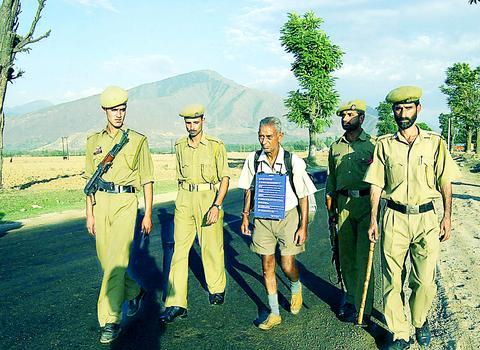Indian and Pakistani foreign ministers yesterday ended their first round of talks over Kashmir on a positive note, resolving to take forward the peace process, an official said.
"There is a commitment ... there is determination to take this process forward and make progress in whichever field we can," Indian foreign ministry spokesman Navtej Sarna told reporters.

PHOTO: AP
Sarna said Indian Foreign Minister Natwar Singh and Pakistani counterpart Khurshid Mahmud Kasuri had during their discussions in New Delhi tackled the explosive issue of Islamic militancy in the Indian zone of divided Kashmir.
India's concerns on the cross-border infiltration of Islamic rebels and what New Delhi calls the "infrastructure of terrorism" -- or militant training camps -- in the Pakistan-administered zone of Kashmir were discussed, he said.
"This is a matter of concern and it has been raised in all the meetings," Sarna said.
India accuses Pakistan of arming and training guerrillas in Kashmir, an allegation Islamabad denies although it openly offers diplomatic support to what it calls the Kashmiris' rightful struggle for self-expression.
More than 40,000 people have died in Indian Kashmir since the launch of the rebellion in 1989.
The foreign ministers also discussed a number of issues including a bus link connecting the two zones of Kashmir, Sarna said.
"Both ministers had a very long one-on-one meeting," he said, describing the talks between Kasuri and Singh as having taken place in a "friendly, cordial, affable and constructive atmosphere."
The meeting was a review of a series of meetings between bureaucrats of the two countries on a number of issues including trade, terrorism, drug trafficking and Kashmir between June and last month, Sarna said.
"This is an occasion to look forward to the engagement in terms of dialogue between the two countries in whatever form is coming up ahead," Sarna added.
The foreign ministers wind up their talks today.
Kasuri was ready later yesterday to call on former Indian prime minister Atal Behari Vajpayee, who set the peace process in motion last April by extending a "hand of friendship" to Pakistan.
Kasuri was also to meet India's opposition leader Lal Krishna Advani and Kashmiri separatist leader Mirwaiz Umer Farooq before attending a dinner later yesterday hosted by Natwar Singh.
Today, he was to call on Indian Prime Minister Manmohan Singh and National Security Advisor J.N. Dixit besides attending the second round of the formal talks.
He is also due today to meet India's oil minister Mani Shankar Aiyar over lunch to discuss the future of a proposed US$3.5 billion pipeline designed to transfer gas from Iran to India through Pakistan.

AIR SUPPORT: The Ministry of National Defense thanked the US for the delivery, adding that it was an indicator of the White House’s commitment to the Taiwan Relations Act Deputy Minister of National Defense Po Horng-huei (柏鴻輝) and Representative to the US Alexander Yui on Friday attended a delivery ceremony for the first of Taiwan’s long-awaited 66 F-16C/D Block 70 jets at a Lockheed Martin Corp factory in Greenville, South Carolina. “We are so proud to be the global home of the F-16 and to support Taiwan’s air defense capabilities,” US Representative William Timmons wrote on X, alongside a photograph of Taiwanese and US officials at the event. The F-16C/D Block 70 jets Taiwan ordered have the same capabilities as aircraft that had been upgraded to F-16Vs. The batch of Lockheed Martin

GRIDLOCK: The National Fire Agency’s Special Search and Rescue team is on standby to travel to the countries to help out with the rescue effort A powerful earthquake rocked Myanmar and neighboring Thailand yesterday, killing at least three people in Bangkok and burying dozens when a high-rise building under construction collapsed. Footage shared on social media from Myanmar’s second-largest city showed widespread destruction, raising fears that many were trapped under the rubble or killed. The magnitude 7.7 earthquake, with an epicenter near Mandalay in Myanmar, struck at midday and was followed by a strong magnitude 6.4 aftershock. The extent of death, injury and destruction — especially in Myanmar, which is embroiled in a civil war and where information is tightly controlled at the best of times —

China's military today said it began joint army, navy and rocket force exercises around Taiwan to "serve as a stern warning and powerful deterrent against Taiwanese independence," calling President William Lai (賴清德) a "parasite." The exercises come after Lai called Beijing a "foreign hostile force" last month. More than 10 Chinese military ships approached close to Taiwan's 24 nautical mile (44.4km) contiguous zone this morning and Taiwan sent its own warships to respond, two senior Taiwanese officials said. Taiwan has not yet detected any live fire by the Chinese military so far, one of the officials said. The drills took place after US Secretary

THUGGISH BEHAVIOR: Encouraging people to report independence supporters is another intimidation tactic that threatens cross-strait peace, the state department said China setting up an online system for reporting “Taiwanese independence” advocates is an “irresponsible and reprehensible” act, a US government spokesperson said on Friday. “China’s call for private individuals to report on alleged ‘persecution or suppression’ by supposed ‘Taiwan independence henchmen and accomplices’ is irresponsible and reprehensible,” an unnamed US Department of State spokesperson told the Central News Agency in an e-mail. The move is part of Beijing’s “intimidation campaign” against Taiwan and its supporters, and is “threatening free speech around the world, destabilizing the Indo-Pacific region, and deliberately eroding the cross-strait status quo,” the spokesperson said. The Chinese Communist Party’s “threats